Book contents
- Frontmatter
- Dedication
- Contents
- List of Illustrations
- Preface
- List of Abbreviations
- Introduction
- 1 The Fiscal System under Louis XIV
- 2 The Rise of the Administrative Monarchy
- 3 Nicolas Desmaretz and Company
- 4 Handling Ideas for Reform
- 5 The Establishment of the Dixième
- 6 After the Dixième
- Conclusion
- Appendix 1 The Conseil d’en haut, or the Council of Ministers
- Appendix 2 Members of the Royal Council of Finances under Louis XIV
- Appendix 3 Controllers General, Directors, and Intendants of Finances
- Appendix 4 Glossary of Terms
- Notes
- Bibliography
- Index
4 - Handling Ideas for Reform
Published online by Cambridge University Press: 14 February 2023
- Frontmatter
- Dedication
- Contents
- List of Illustrations
- Preface
- List of Abbreviations
- Introduction
- 1 The Fiscal System under Louis XIV
- 2 The Rise of the Administrative Monarchy
- 3 Nicolas Desmaretz and Company
- 4 Handling Ideas for Reform
- 5 The Establishment of the Dixième
- 6 After the Dixième
- Conclusion
- Appendix 1 The Conseil d’en haut, or the Council of Ministers
- Appendix 2 Members of the Royal Council of Finances under Louis XIV
- Appendix 3 Controllers General, Directors, and Intendants of Finances
- Appendix 4 Glossary of Terms
- Notes
- Bibliography
- Index
Summary
The court surrounding Louis XIV was the pinnacle of society of its day. The king, God’s lieutenant on earth, was surrounded by his servants and the great families of France in much the same way that God was said to be surrounded by cherubim, seraphim, angels, and saints, in the religious doctrines of the time. The king controlled France just as God controlled the universe. Unlike the deity, however, Louis XIV had to rely on intermediaries to execute his will and report to him about the activities of his people. Louis relied on government officials as well as people at court to keep him informed and to act as liaisons with the people.
The court was more than a pretty ornament wherein foppish noblemen and high-fashioned noblewomen partied and socialized during the intervals between required attendance at the king’s public appearances. The image of the court as a gilded cage cut off from French society and ignorant of the daily lives of France’s people might satisfy some feelings of class antagonism but disguises the court’s function. Courtiers used their proximity to the king and his government to provide services to people outside the court, including those residents of their provinces or seigneuries who wished to appeal to the king for favors, whether through courtiers’ positions as governors or lieutenants general in the provinces, or simply as grace due from a great lord—noblesse oblige, so to speak.
Jacques Levron relates the tale of M. Grandet, mayor of Angers, whom the men of his city charged with journeying to court to petition the king for royal letters patent to establish a literary academy in Angers in 1685. The governor of Anjou would normally have assisted with this kind of appeal, except that the man who held this position at the time was Louis de Lorraine, comte d’Armagnac, who, as grand écuyer (squire) of France, was called Monsieur le Grand, and was known to be reluctant to make just any plea to the king. Fortunately for Grandet, he met a gentleman ordinary of the king named Chevais du Boullay, who originally came from Anjou. The latter agreed to place Grandet, an especially tall man, near the king’s table during the royal supper so that the Sun King would see him easily.
- Type
- Chapter
- Information
- Louis XIV's Assault on PrivilegeNicolas Desmaretz and the Tax on Wealth, pp. 128 - 159Publisher: Boydell & BrewerPrint publication year: 2012

